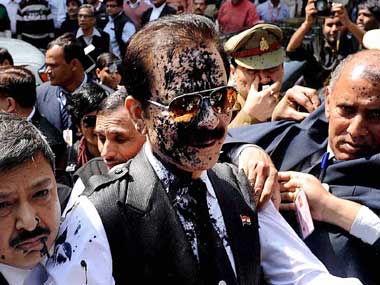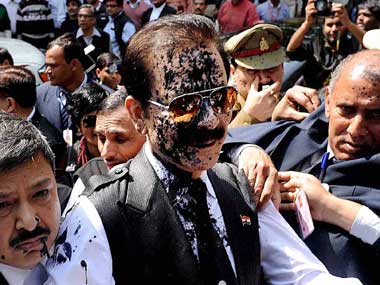One of the rules I live by is: Never trust anyone who wears gold-rimmed aviators and safari suits. Chances are these people are in the government, help politicians to siphon money or have willingly made people put their hands on their chest to say “Sahara pranaam”. Either way, chances are they’re extremely rich, of dubious character and will get you knocked off if they are rubbed the wrong way. Luckily, India still has some institutions left that even aviator-wearing Dawood Ibrahim lookalikes can’t mess with, and one of them is the Supreme Court. [caption id=“attachment_1421961” align=“alignleft” width=“380”]  Subrata Roy with ink all over his face: PTI[/caption] This week the Supreme Court summoned Subrata Roy and ordered him to pay nearly 3 crore investors what he owes them (over Rs 22,000 crores). Before Roy managed to enter court, a lawyer threw black ink on his face, presumably to wipe off his smug smile. Later, the court reminded his council Ram Jethmalani (you know you’re guilty when you’re being defended by Ram Jethmalani) of how Roy had once said, “The Supreme Court can go to hell.” Roy is now languishing inside Tihar Jail while his public relations team is on overdrive, trying to gain our sympathy with stories like, “Sahara chief only eats one roti and dal inside prison.” There are three things I want to talk about here. The first is that Indian protestors really need to start getting more creative with their insults. Blackening someone’s face with ink or shoe polish — long considered a form of public humiliation — is so old that even Bollywood comedies have rejected it. Then we have the shoe throw. Many have tried to do this to Indian politicians, except our lack of aim and the lightness of the Hawaii chappal means great aerodynamics but virtually no actual harm being caused. The only real consequence is you being without one piece of footwear in prison. The closest we have got to an agreeable form of protest was when an unruly Sikh gentleman ended up slapping Sharad Pawar. The thappad is such a traditional Indian remedy for sorting children out that even though it achieved no justice, Indians across the country felt some relief. All of these forms of protest are illegal and I am in no way supporting them, but I can see the utter frustration that pushes one to lash out singlehandedly. I am surprised no ex-Kingfisher employee tried to slap Vijay Mallya after watching him buy players for millions at the IPL auction. If it had happened, no one would have been surprised. The second is how absolute power corrupts. When you’re a person of extreme wealth and have political connections in every pocket, even the Supreme Court doesn’t scare you. Roy might have been silly enough to say it out loud, but it’s a statement that isn’t surprising. I’m glad the Supreme Court made an example of that statement. To average citizens, it provides a mild glimmer of hope that the entire justice system hasn’t sold out to those who can afford it. Finally, the public relations spin: Why is it that everytime a famous person goes to prison we are inundated with human-interest stories? When Sanjay Dutt, currently vacationing in Mumbai (again) first went to Yerawada Jail, we were flooded with news of him helping out other inmates, helping make tables and chairs and taking pictures with officers. With Roy, we know he’s eating only dal and roti, like other inmates. My question is, isn’t that the point? Why was he expecting better treatment? Just because his company sponsored the Indian cricket team even though it might have duped crores of investors of their money? Somehow we’re supposed to sympathise, citing our own upper-middle class nature because if we were ever in prison, we wouldn’t want to be treated like common prisoners either. It’s a way of creating a favourable public opinion amongst those who aren’t directly affected by his actions, but are powerful enough as a collective to perhaps influence his fate. The law will take its course, but I hope this incident becomes an example for other influential people in the future. The judiciary is not something to be scoffed at and neither is public sentiment.
The judiciary is not something to be scoffed at and neither is public sentiment.
Advertisement
End of Article
Written by G Khamba
Gursimran Khamba is a writer, comic and the co-founder of All India Bakchod. He blogs at http://www.gkhamba.com/. see more


)
)
)
)
)
)
)
)
)



